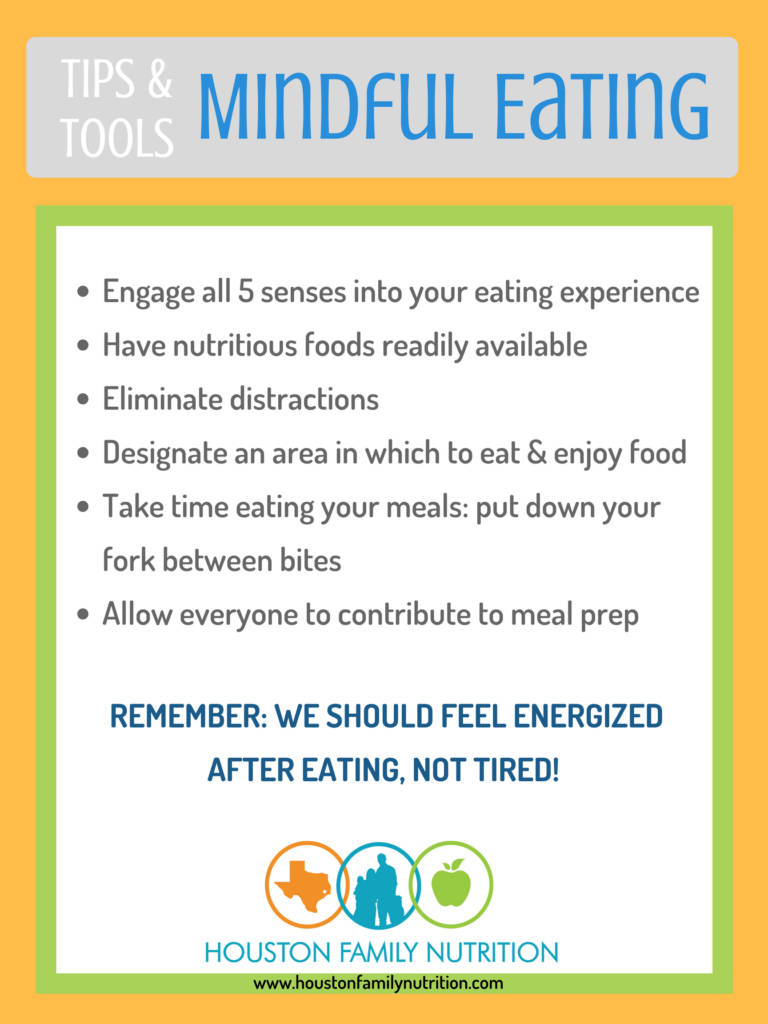6 Tips for Mindful Eating

Food is our ticket to optimal health and highest level of achievement! Our bodies need a fresh supply of a variety of nutrients on a daily basis to perform at its best and stay in great shape. Hunger is a primal cue urging us to replenish nutrients by finding a balanced meal. Food today is so much more than just a means to adequate nutritional intake. It has become comfort, stress management, reward, expression of love, art, and opulence. These factors can conflict with food’s primary mission which is to nourish our bodies and fuel our aspirations!
To make things worse, today’s diet culture promotes the idea that nutritional health is achieved through cutting back. We hear a lot about cutting calories, sugar, carbohydrates, dairy, and gluten. The consequence of these restrictive patterns is that valuable nutrients get cut as well! Furthermore, hunger, our body’s request for nutrition, is viewed as a nuisance and something we are taught to ignore or mitigate with low calorie foods of poor nutrition quality.
Mindful Eating is a practice that aims to reorient our body to food as a powerful means of nourishment. It encourages the eater to apply conscious thought into decisions about eating and increase awareness about the eating experience. When we appreciate food’s power, honor our hunger, and pay attention to our body’s response to food, we learn to make food decision that line up with our health and enterprise interests.
Mindful Eating takes some practice but it can be achieved by anyone! It starts with building structure into our usually unstructured food routine. Don’t confuse this structure with the rigid “laws” promoted in fad diets. Mindful Eating structure is meant to stimulate thought around food choices rather than control the choices we make.
Here are 6 tips to help you implement some Mindful Eating structure:
Engage all 5 Senses in Eating
When eating, focus on all the different sensory inputs the food provides. How does it smell, feel, or taste? How does it look? Paying attention to every aspect of the food helps you enjoy it to the utmost, so you leave the meal feeling full and satisfied. It also raises our appreciation for food through exploration.
Have Nutritious Foods You Enjoy Easily Accessible
To make mindful eating easier, ensure that your favorite nutritious foods are easily accessible. Prep foods in advance that can be mixed and matched to create different tastes and textures. Make sure your fridge and pantry are stocked with foods you would be happy eating. When thinking about what makes you happy, take into account the full picture, from the actual act of eating, to how you feel afterwards. If there’s a food you find yourself eating mindlessly that makes you feel terrible after, don’t keep it in the house.
Eliminate Distractions
When you’re eating, try to focus solely on your food. Watching TV, working, browsing the web, all these things detract your attention from your food and you can end up finishing your meal without even having consciously enjoyed it. It robs us of the ability to assess our hunger and satiation cues making it likely that we will overeat or undereat.
Designate an Area in Which to Sit & Enjoy Your Food
Along the same lines, make sure you have a place where you can sit and enjoy your food. Over time, the designated area will serve as a reminder to approach meals and snack with diligence. Eating on the run, at our desks or in front of the TV does not give us the same opportunity to be fully present.
Take Time While Eating Your Meal: Put Your Fork Down in Between Bites
Putting your fork down between bites forces you to slow down. Eating slower allows you to enjoy your food more, with the important added benefit of ensuring your brain receives the signal that you are full, in a timely manner. Eating too quickly means the brain gets the “I’m full” message long after we’ve over-consumed, leaving us feeling bloated, tired, and dissatisfied with the meal.
Allow Everyone to Contribute to Food Prep
Involve everyone in the food prep and it becomes a group effort everyone can benefit from. Kids are more likely to eat nutritious foods they helped create. Preparing food with a partner or friend can turn what could be a chore into an enjoyable experience, helping focus your mind on the food you’re creating and ensure you enter your meal with a mindful focus.
These are some of our recommended tips for mindful eating. Want a constant reminder? Print out our pdf below and hang it on your fridge! How do you practice mindful eating?





